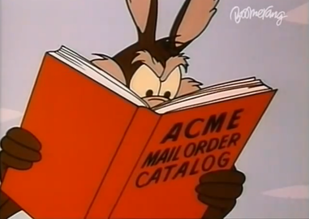
With age, we're rather confident that we've acquired a vast amount of wisdom. Ask us anything, and we'll have a comment; we're that good, right? Yet that storehouse of wisdom can be our undoing if we're closed off from wisdom that is sacred and spiritual. Would you recognize the challenge of this kind of wisdom, or would you double-down on your own, acting like Wile Coyote and turning to your Acme Catalog?
Proverbs 1 portrays Wisdom as a woman, crying out in the streets to those who pay her no heed. She begins to chastise "the simple ones [who] love their simple ways, the mockers [who] delight in mockery, and fools [who] hate knowledge." Hmm. 'Could that be me?' we might ask ourselves. She declares her desperate desire to share with them , but is incensed by rejection. Her tone turns quite nasty: "I will turn and laugh at your disaster; I will mock when calamity overtakes you." We might realize from our own experience how difficult it can be to change our minds when our hearts, minds, and spirits are set on a particular course. To abandon that path for a different one is exceptional. We double-down, justify, rationalize, and forge ahead.
Like Pharaoh who never relented for long when challenged by Moses to obey the will of Yahweh-God, we are prone to stubbornly clinging to our assumptions. For Pharaoh, who saw himself as a god, who commanded the wealthiest and most powerful empire in the western world, he wasn't about to let the god of the slaves, the losers, the ones who served him, tell him anything. Even after the brutal deaths of the first born and his release of the Hebrew slaves, he recovers to rally his army and give pursuit, destroying his forces when the sea collapses on them.
There is a certain point of no return where Wisdom cannot be found or heard because we're so enmeshed in our own wise designs and schemes and beliefs. Indeed, calamity is the end result, the final chapters in our own undoing.
The book of James (epistle?) also turns to the question of worldly, profane wisdom versus sacred, spiritual wisdom. "Envy and selfish ambition" define worldly wisdom. "But the wisdom that comes from heaven is first of all pur; then peace-loving, considerate, submissive, full of mercy and good fruit, impartial and sincere."
The key word comes in the beginning of the passage: "Who is wise and understanding among you? Let him show it by his good life, by deeds done in the humility that comes from wisdom." That word "humility" is one element that we lack when regarding our own wisdom. If we understand its limitations, perhaps we can open the door to the higher wisdom, that which is sacred and spiritual.
Check out the sermon video below and note the downloads below the video panel.
Proverbs 1 portrays Wisdom as a woman, crying out in the streets to those who pay her no heed. She begins to chastise "the simple ones [who] love their simple ways, the mockers [who] delight in mockery, and fools [who] hate knowledge." Hmm. 'Could that be me?' we might ask ourselves. She declares her desperate desire to share with them , but is incensed by rejection. Her tone turns quite nasty: "I will turn and laugh at your disaster; I will mock when calamity overtakes you." We might realize from our own experience how difficult it can be to change our minds when our hearts, minds, and spirits are set on a particular course. To abandon that path for a different one is exceptional. We double-down, justify, rationalize, and forge ahead.
Like Pharaoh who never relented for long when challenged by Moses to obey the will of Yahweh-God, we are prone to stubbornly clinging to our assumptions. For Pharaoh, who saw himself as a god, who commanded the wealthiest and most powerful empire in the western world, he wasn't about to let the god of the slaves, the losers, the ones who served him, tell him anything. Even after the brutal deaths of the first born and his release of the Hebrew slaves, he recovers to rally his army and give pursuit, destroying his forces when the sea collapses on them.
There is a certain point of no return where Wisdom cannot be found or heard because we're so enmeshed in our own wise designs and schemes and beliefs. Indeed, calamity is the end result, the final chapters in our own undoing.
The book of James (epistle?) also turns to the question of worldly, profane wisdom versus sacred, spiritual wisdom. "Envy and selfish ambition" define worldly wisdom. "But the wisdom that comes from heaven is first of all pur; then peace-loving, considerate, submissive, full of mercy and good fruit, impartial and sincere."
The key word comes in the beginning of the passage: "Who is wise and understanding among you? Let him show it by his good life, by deeds done in the humility that comes from wisdom." That word "humility" is one element that we lack when regarding our own wisdom. If we understand its limitations, perhaps we can open the door to the higher wisdom, that which is sacred and spiritual.
Check out the sermon video below and note the downloads below the video panel.
| 09-13-15-ff-answers.pdf |
| 09-13-15-wisdom_alert.pdf |
